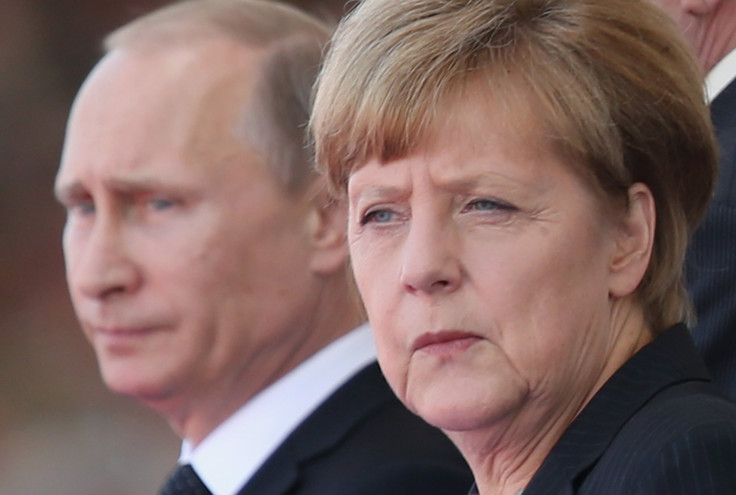Russia Stirring Anger In Germany Over Refugee Crisis To Topple Angela Merkel, NATO Expert Claims

Russia is stoking the refugee crisis in Europe by stirring anger in Germany, with the aim of toppling Chancellor Angela Merkel, NATO’s senior-most expert on strategic communications claimed, according to the Guardian. Merkel has faced immense domestic pressure to backtrack on her open-arms refugee policy.
NATO analysts have identified that Moscow is attempting to remove Merkel — a strong supporter of sanctions against Vladimir Putin’s regime — from her position by provoking Germany over the influx of refugees in the country, which last year took in more than 1 million people, mostly fleeing war-torn Syria.
Jānis Sārts, director of NATO’s Strategic Communications Centre of Excellence, based in Riga, Latvia, told the Observer that Russia had allegedly funded extremist forces previously in Europe, and there is now evidence of Russia fueling anger against Merkel in Germany, according to the Guardian.
“[Russia] is establishing a network that can be controlled. You can use it as they have tried to do in Germany, combined with the legitimate issue of refugees, to undercut political processes in a very serious way,” Sārts reportedly said, adding that he was talking as an expert and not as a NATO spokesman. “Angela Merkel has been a very adamant supporter of continued sanctions against Russia. If it was just punishment, that would be OK — but it is testing whether they can build on pre-existing problems and create a momentum where there is political change in Germany.”
“I think they test whether they can — in such a big country, with not so many vulnerabilities in normal times — actually create a circumstance through their influence where there is a change of top leadership. They are using Russian speakers, social media, trying to build on the existing faultlines. Use the far right narrative and exploit that,” he reportedly said.
Sārts, who has access to intelligence briefings, also reportedly added: “In general terms, you can trace Russian funding to the extreme forces in Europe. Either left or right — as long as they are extreme, they are good to come into the Russian picture as of possible use in their tactics.”
Merkel, who has been demanding a fair distribution of refugees among all European Union members, has faced several criticisms for her policies. Merkel also supports a plan under which Turkey — a transit country used by many refugees coming to Europe from Syria — would seal its borders and then fly refugees to Europe where they would be offered asylum under an EU quota system.
Last week, top NATO General Philip Breedlove told U.S. lawmakers that Russian airstrikes against Syrian rebels and Islamic State group targets are leading to an increase in the number of refugees from the region.
The Russian defense ministry dismissed NATO allegations that Moscow, along with Syrian President Bashar Assad, is “deliberately weaponizing” the refugee crisis against the West.
Since the civil war in Syria began about five years ago, an estimated 470,000 Syrians have been killed, 7 million people internally displaced and around 4.5 million forced to leave the country.
© Copyright IBTimes 2024. All rights reserved.





















